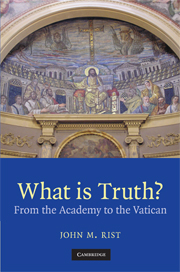Book contents
- Frontmatter
- Contents
- Acknowledgments
- Abbreviations
- Introduction: Partial and universal truth
- 1 The human race, or how could women be created in the image and likeness of God?
- 2 Divine justice and man's “genetic” flaw
- 3 Divine beauty: Nature, art and humanity
- 4 The origin and early development of episcopacy at Rome
- 5 Caesaropapism, theocracy or neo-Augustinian politics?
- 6 The Catholic Church in “modern” and “post-modern” culture
- 7 Looking at hopes and fears in the rear mirror
- Bibliography
- Index
2 - Divine justice and man's “genetic” flaw
Published online by Cambridge University Press: 05 June 2012
- Frontmatter
- Contents
- Acknowledgments
- Abbreviations
- Introduction: Partial and universal truth
- 1 The human race, or how could women be created in the image and likeness of God?
- 2 Divine justice and man's “genetic” flaw
- 3 Divine beauty: Nature, art and humanity
- 4 The origin and early development of episcopacy at Rome
- 5 Caesaropapism, theocracy or neo-Augustinian politics?
- 6 The Catholic Church in “modern” and “post-modern” culture
- 7 Looking at hopes and fears in the rear mirror
- Bibliography
- Index
Summary
The judgments of God are such as to make the soul shiver.
AugustineAUGUSTINE VS JULIAN WITH HINDSIGHT
In the previous chapter I studied the gradual development, within Christianity, of the significance of the biblical teaching that man is created in God's image, and showed how the Church has learned to accept explicitly that both men and women are equally so created. But clearly the hoped-for nature of the image must depend on the nature of the God who is imaged, and I closed the chapter with the implication that a God possessed of the freedom of indifference would have done no good to Christianity's moral reputation.
To approach the question of what kind of God is imaged by man, we need to formulate an account of divine attributes, among which two of the most important, in Christianity, are justice and mercy. Hence the present chapter, in investigating some of the difficulties Christianity has experienced in reconciling these attributes, will at the same time illuminate what we can understand to be the attitude of God to man, and hence of man to God. In the course of the discussion it will become clear how Christianity has with difficulty avoided some of the morally unacceptable accounts of God and his absolute power that monotheism can too easily generate. The struggle that I shall examine in this chapter was not the only occasion in which was raised the possibility in Christianity of an arbitrary God, but it was the most important, and many of the later battles may be looked on as attempts – for better or worse – to reconsider or re-stage it.
- Type
- Chapter
- Information
- What is Truth?From the Academy to the Vatican, pp. 104 - 142Publisher: Cambridge University PressPrint publication year: 2008

